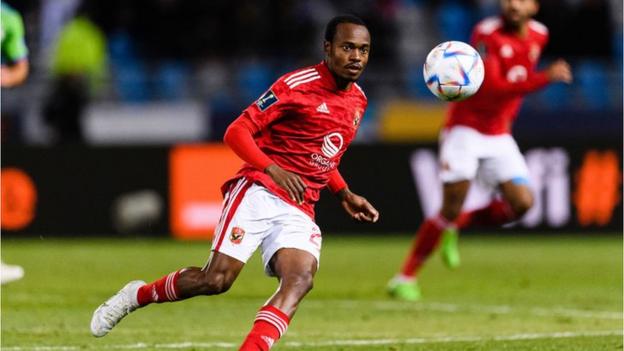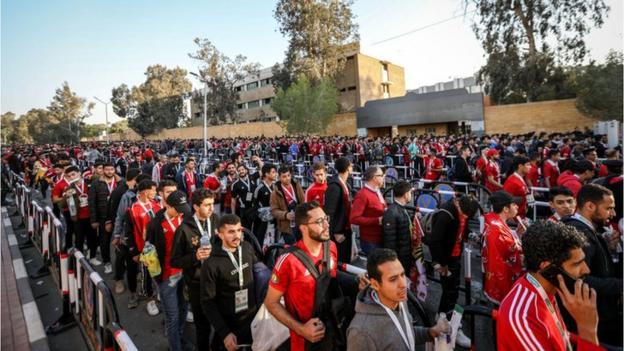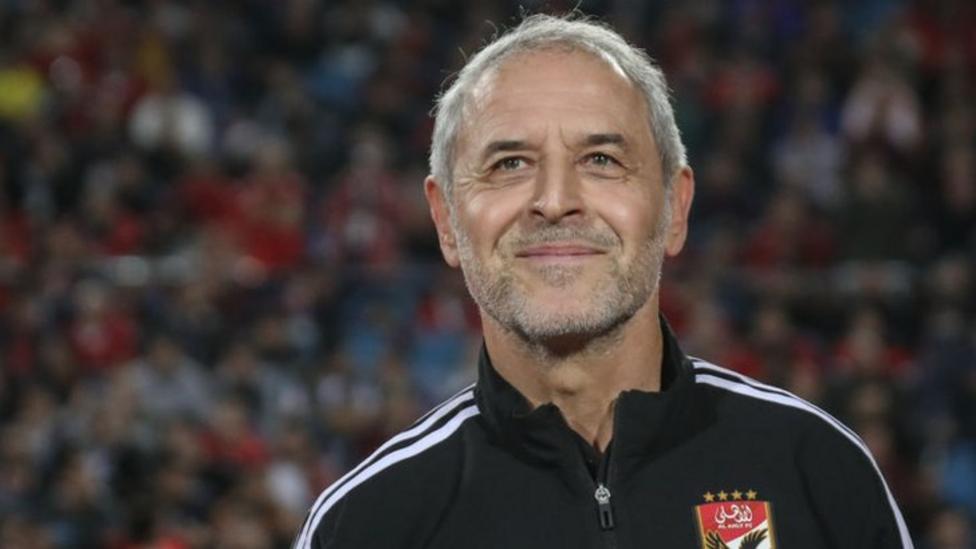As Egypt’s Al Ahly prepare to host Moroccan title-holders Wydad Casablanca in the first leg of this year’s African Champions League, comparisons are being made between the Cairo giants and Real Madrid – Europe’s most successful club in continental competition.
Like Madrid, Al Ahly are record Champions League winners and both clubs have been conferred the title of “Club of the Century”.
This year, the Egyptians are back in the final for a fourth year running.
And like Madrid, there is more to the Egyptian giants than just the football.
- El Moutaraji scores twice as Wydad Casablanca beat Al Ahly
- Club World Cup: Egypt’s Al Ahly lose to Real Madrid in semi-final
For African football lovers, the 2023 finale – which begins on Sunday – is a predictable one.
For starters, this year’s fixture is also a rematch of last year’s, which Wydad won two-nil.
Secondly, North African clubs have totally dominated Africa’s premier interclub competition since the turn of the millennium, winning 16 of the last 23 editions of the tournament.
Yet, even amongst the very best North African clubs, Al Ahly stands out having won the elite African title for a record 10 times.
Since being voted Caf’s (Confederation of African Football) Club of the Century in 2001, Ahly have been perennial Champions League contenders, making 14 out of 22 finals appearances, winning on eight of those occasions.
There are various parameters that explain the long-standing success of Al Ahly, but the club’s financial muscle remains its main asset on the continental level.
While some clubs in the Maghreb can cobble together yearly budgets upwards of $10 million, no other teams come close to possessing the purchasing power Al Ahly enjoys on a yearly basis.
The football division of Al Ahly Sports Club earned $16.7 million last season from prize money, marketing, player sales and other revenue streams.
In the very same season, the club operated at a deficit, reportedly spending a little more than $23 million on transfers, the wage bill, logistics and other miscellaneous expenses.

One curious way the club makes up their debt is through the socio-cultural phenomenon of club houses, which don’t exist anywhere else on the African continent.
Notable clubs in Egypt build club houses, which are equipped with swimming pools, restaurants, barber shops, fitness centres and other amenities.
Counterintuitively, the facilities are not necessarily reserved for the first-team; on the contrary, supporters are the main beneficiary of club houses, which they gain access to by buying expensive membership passes.
Families of the Egyptian middle and upper class often spend their weekends at club houses, having fun and also making social connections.
An all-access family pass to all four of Al Ahly’s club houses in Cairo costs upwards of $20,000.
During the 2021/2022 season, Al Ahly benefitted from more than $21 million of membership related revenue alone, allowing the club to shore up the significant deficit on its footballing books and sign players like former Brighton winger, and South African international, Percy Tau, on a $100,000 per month salary.
They also scour the continent and sign the best talent around, such as Malian international, Aliou Dieng who signed from MC of Algiers, and Tunisian international, Ali Maaloul, who signed from CS Sfaxien.
Although financial resources are a crucial factor in Al Ahly’s dominance, to equate Al Ahly’s success to its bottom line would not be fully accurate.
The club’s history and identity are what energise its fanbase to be the driving force that they are.

Al Ahly was established by and for Egyptians in 1907, when Egypt was under British occupation, and the Cairo club’s first trophy was the Sultan Hussein Cup, exactly 100 years ago — they’ve gone on to win 117 total titles since then.
In addition to the many honours the club have won, Al Ahly also became the country’s most popular club because the first players and administrators were actively advocating for Egyptian nationalism.
“I don’t think people realise how big the fanbase really is.” Ahmed Assem, a passionate Ahly supporter, tells BBC Sport.
“More than half of one of Africa’s most populated and most football-mad countries supports one club — it’s too big to fail.”
Assem’s point was on display when Al Ahly went to play Aswan a few months ago. More than half of the stadium supported Al Ahly, even though Aswan is closer to Sudan than it is to Cairo.
In recent Caf Super Cups and Egyptian Super Cups, which have taken place in the United Arab Emirates and Qatar, the club has managed to attract tens of thousands of supporters on neutral grounds and drum up great atmospheres.
“There’s an obsession with winning and it’s almost become unhealthy.”
Extending the record
Al Ahly are now indefatigably chasing their eleventh Champions League title, and they are the bookies’ favourites heading into the two legs versus Wydad.
“This match is not about avenging last year’s loss in the Champions League final. It’s about winning titles, like every single season.” Says Hosam Hasan, an Al Ahly super fan.
Schedule congestion led to a slow start to this year’s campaign, as Tau and co accumulated losses to Sudan’s Al Hilal and South Africa’s Mamelodi Sundowns.
But Marcel Koller’s men have been flying in the knockout stages and they’ll rely on 50,000 spectators at Cairo International Stadium to build a sizable lead ahead of the return leg in Morocco.
In the grand scheme of things, Al Ahly supporters know what the rest of the continent does as well. Even if they fumble the Champions League title away over the coming weeks, they will be seriously challenging again next year.
